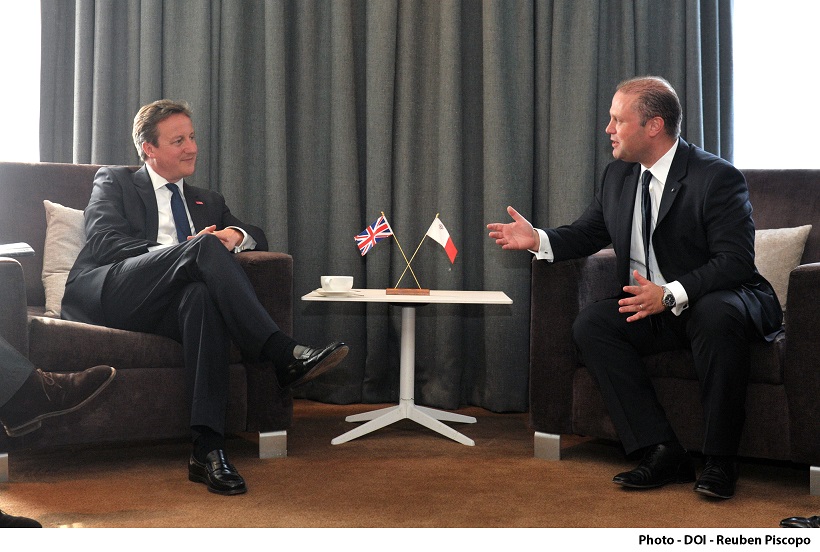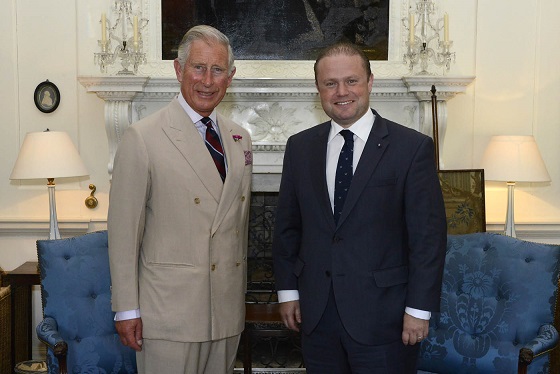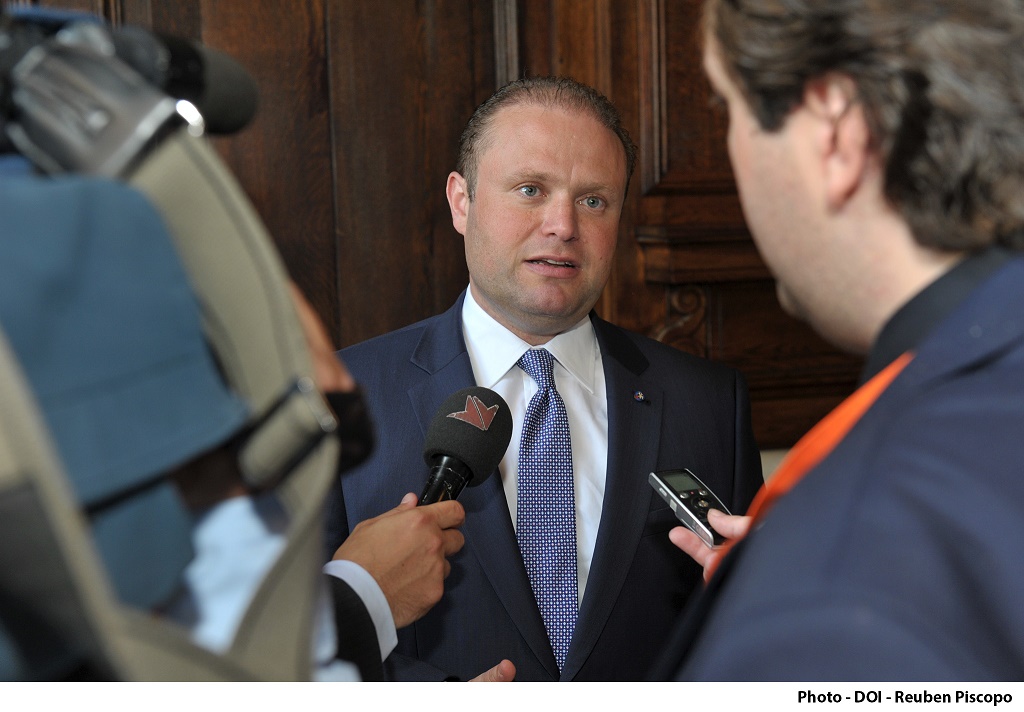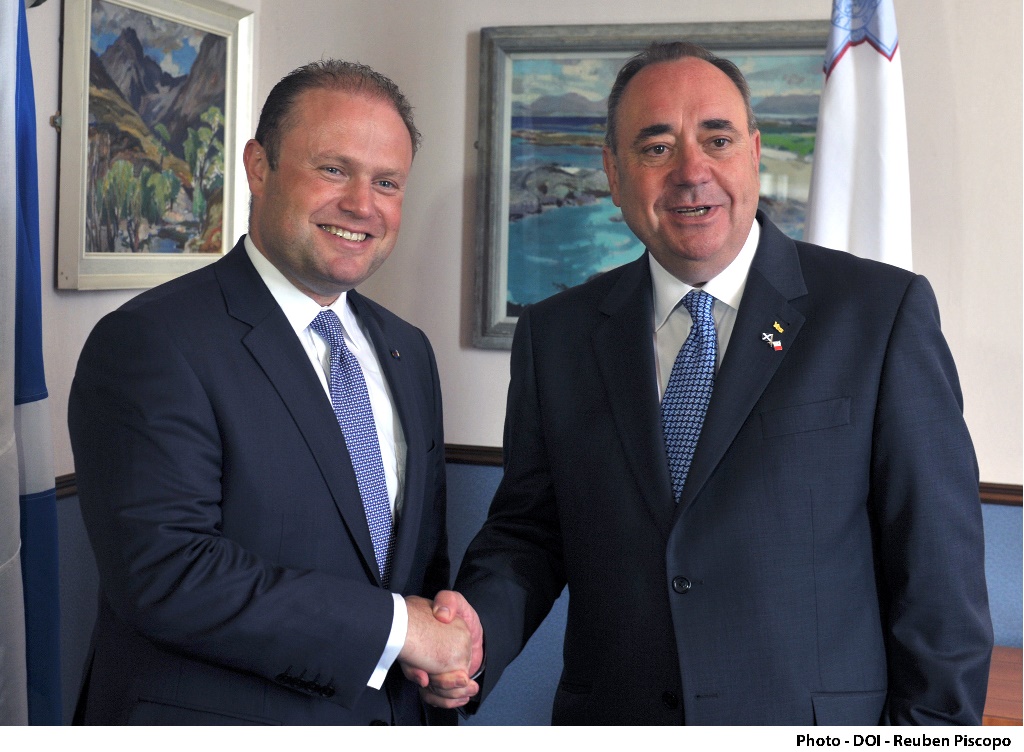The Maltese Prime Minister spent the past week in London and Glasgow, holding meetings and giving speeches on the Commonwealth, need for its reform, and the next Commonwealth Heads of Government Meeting (CHOGM) to be held in Malta next year.
CHOGM, or as Prime Minister Muscat would like for it to be referred to; “The Commonwealth Summit,” (as he does not believe the Maltese people, or rather most people, understand the term CHOGM) will be a watershed for the Commonwealth’s future.
Dr Muscat argued that meetings in the past were hindered by excessive diplomacy, giving the Communiques as an example. These take the better part of days to write and attempt to appease each and every nation, often resulting in contrasting paragraphs, he said. The Prime Minister wishesto completely do away with this and instead formulise a summary of what was said during meetings.

(Dr Muscat with British PM David Cameron)
Having attended previous meetings with Commonwealth Heads of State, the Maltese Premier chose to give another example of such excessive diplomacy in action. Commonwealth Leaders would sit down next to each other, switch seats and engage in one on one discussions, rather than focus on solutions ventures as a whole. This left Dr Muscat at a loss as to where to sit and next to whom, he explained.
“Malta attaches great importance to the Commonwealth and we believe that this Heads of Government meeting will be a watershed event in providing an opportunity for Commonwealth leaders to discuss important issues that impinge on the lives of all Commonwealth citizens. We are committed to ensure that trade remains high on the agenda as reflected in the key statements and discussions. I envisage a frank and open exchange of views between us and I look forward to welcoming you in Malta for a successful meeting,” the PM stated.

(Dr Muscat with Prince Charles)
Dr Muscat made reference to the Commonwealths historic roots, identifying the need for countries to focus more on the future rather than the past. The Commonwealth is a landscape of evolving economic trends where opportunities should constantly arise, where people can and should engage with one another to maximize the opportunities available to develop greater economic ties, the Prime Minister said.
During a speech at the London School of Economics, Dr Muscat compared the Commonwealth to a sick patient, prior to receiving diagnosis and medical help. A question thrown at the Premiere asked why Malta does not just leave the Commonwealth if the country is so unhappy with the way it is run. Dr Muscat responded; “Malta doesn’t want to leave, however wants to change the Commonwealth. When The summit is hosted in Malta, changes will be implemented; ones which will help real people and will make clear that no one can come in the stead of Heads of State, meaning that they must personally attend. The whole meeting should not take longer than two days, where we will sit down and thrash out the issues”.

The Prime Minister chose to poke fun at the British football during his speech, just weeks following their early world cup exit. “To me, the independent and Republican ethos of my nation was never an issue to be questioned. I always considered this a natural state of affairs. We consider not being an independent nation or not having a Republican constitution as unthinkable as England winning the World Cup!”
One for the money… two for the show
Having noticed that a certain ex-Labour journalist Julia Farrugia was present during the Royal Commonwealth Society discussions representing Malta, this newsroom quickly probed for the reason regarding her attendance.
On the sheet listing the attendees, her name was the only one present without her official title or position. This, when interns were listed as being interns.
Dr Muscat’s response was short and quick. “She’s part of Project Malta”.
Following this revelation, reports in Maltese media showed that no official declaration of her appointment had been made. In these reports, she said that she had been in London for a day of meetings and was then invited to join in on the Royal Commonwealth Society meeting. She will primarily focus on communication and stakeholder coordination.
Dr Muscat also held meetings with the British Minister for Europe, the Commonwealth Secretary General and Scotland’s First Minister.
Dr Muscat expressed his intent to hold as many meetings with leaders as possible including during the UN General Assembly which will take place later this year, in order to gather more ideas on how to improve the Commonwealth.

A possible call to arms
Perhaps the only issue of equal, if not higher importance than the Commonwealth discussed while on the trip, was that of the Libyan crisis. On Wednesday, Dr Muscat held talks with UK Premier David Cameron on the issue, where they both hoped for a diplomatic solution to the violence re-erupting in the North African state, still fresh off the mark from a bloody civil war.
The Maltese PM made clear that should a diplomatic solution not be found, and should the Libyan people request UN assistance, then the West should be ready to respond and help drive out the extremist elements found within Libya. The UN resolution which led to air support during the last Libyan revolution is still in place, and as such no new resolution would need to pass, he explained.
Lack of security in Libya will result in an increased immigration problem, Dr Muscat said, however given Libya’s role as a crucial trading partner for Malta, and the large amount of Maltese investment in the country, Libya going belly up would cause some problems for Malta.
An interesting speculation can be made considering Dr Muscat already knew about the abduction of the Maltese oil worker in Libya, which would explain the Prime Minister’s strong stance against the Libyan extremists.
Last Sunday the Malta Independent ran an article relating to the situation in Libya and the lack of evacuation procedures. Foreign Minister George Vella had said that; “We are prepared for any situation and will take concrete steps if and when necessary. Prior to the outbreak, we had already created a crisis response centre. In fact, we have already managed to contact 264 persons through telephone calls, Skype and other internet means and they have all assured us that their lives are not in danger”.
“The situation is, of course, bad but it is not as dramatic as it is being made out. Calls to the embassy are being directly diverted to the ministry.”
A Maltese living in Tripoli had said; “They were still fighting last night even though there was an agreement. When we contact the crisis centre all they tell us is that the government is not ready to start evacuation since no country has done it so why should Malta do it? We do not want to hear this; we want to hear that help is on its way. All they tell us is stay indoors.”
Voluntary evacuations for the Maltese in Libya then really began to take effect on Monday, and the press didn’t know about the abduction of a Maltese citizen until later in the week. No formal evacuations have begun.
Sanctions… sanctions… and sanctions
The ongoing situation in Ukraine, and the obliteration of the Malaysian airline flight seemed to arouse personal emotion in the Prime Minister. Perhaps due to the fact that not too long ago, the same flight path was taken by the PM and his family on their way to China.
Dr Muscat took a rather aggressive stance, calling for more sanctions and a united Europe to face this crisis head on. The PM insisted that Russian President Vladimir Putin condemn the rebels. At the time, reports were ongoing questioning whether Russia was actually involved in the destruction of said plane.
He chose to, on CNN, state the need for the EU nations to impose more sanctions on Russia.

UK’s current financial position
Two major economic and political figures spoke during the Commonwealth Games Business Conference. British Premier David Cameron and the Governor of the Bank of England Mark Carney.
The Bank of England Governor mentioned UK’s current investment problem, with too much money invested in slow growing economies.
The UK needs to invest further in Commonwealth countries rather than European countries.
The UK relies heavily on the slow growing advanced economies of Europe which is a staggering 25% below a continuation of its pre-crisis trend, rather than major growing economies in the Commonwealth which only account for a tenth of UK exports. In order to invest further in Commonwealth countries, the UK would need to diversify its investment strategy, he argued.
British Prime Minister David Cameron, following his speech, slung his jacket onto the back of a chair, put hands to hips and told the crowd to fire away during his question and answer session.
He said that the UK is the largest destination for foreign investment in Europe. “Britain is committed to promoting trade around the world. I told our ambassadors, you are representing UK Plc”. Cameron’s speech could have been seen as quite controversial, promoting Britain as ‘open for business’, telling his Ministers and ambassadors to sell the country to investors.
“My industrial policy is clear. I don’t believe in picking winners, but I believe in backing them. We are probably one of the most networked countries in the world and in a world which is ever changing, being part of these networks allows us to punch above our weight. We must not leave these relationships unmodernised, but rather we need to make sure they are working for us. With regards to the EU, we need to reorganise ourselves and make it work for us”.